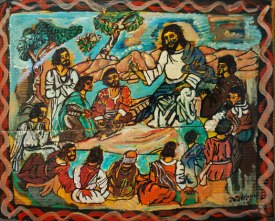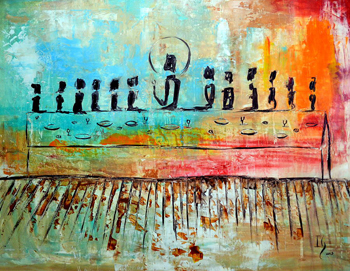For Sunday [month] [day], 2016
Lectionary Readings (Revised Common Lectionary, Year B)
Numbers 11:4-6, 10-16, 24-29
Psalm 19:7-14
James 5:13-20
Mark 9:38-50
Millstones. Stumbling blocks. Maimed bodies. Fire. This week’s Gospel reading offers us some of the harshest and most graphic language in the New Testament. Worse, the disturbing language comes straight from Jesus’s own mouth. “If your hand causes you to stumble, cut it off,” he says. If you cause a “little one” who trusts in God to stumble, you’re better off having a heavy stone wrapped around your neck and drowning in the ocean, he says. If you aren’t willing to cut off your offending eyes, hands, or feet, you’ll be thrown into hell, a place where “the worm never dies, and the fire is never quenched,” he says.
I don’t know about you, but I don’t love this section of Scripture. It’s one of those uncomfortable bits of the Bible that my progressive Christian self is tempted to gloss over. Not that I don’t want to take sin seriously. I do. But hell? Self-mutilation? Death-by-drowning? Whatever happened to “What a Friend We Have in Jesus?” Jesus gentle, meek, and mild? What happened to unfailing forgiveness and mercy, or to the Everlasting Arms of cuddliness?
Maybe some context will help. By this point in St. Mark’s Gospel, Jesus is speaking openly and frequently about his impending death. And it’s not just talk — he’s also making his way south towards Jerusalem, away from safety and towards the cross. In other words, he knows he’s running out of time. He’s grimly aware that he has mere days left to prepare his still clueless disciples for what’s coming.
So he ramps things up. We can feel in this lection, in its exaggerated and violent language, Jesus's growing sense of urgency. His frustration at how easily his disciples get distracted. His impatience at how often they get bogged down in minutiae. “PAY ATTENTION TO WHAT’S IMPORTANT!” he seems to be shouting through the grisly images of hacked off limbs and unquenchable fire. “Faith is hard! So much is at stake! What you say and do, what you focus on, what you prioritize as my disciples — these things matter! Your choices have life-and-death consequences. So please don’t be stumbling blocks. Please don’t make faith harder for yourselves and for others than it already is!”
 |
What sets Jesus off in this particular instance is his disciples’ complaint that someone else — an outsider — is casting out demons in Jesus’s name. “We tried to stop him,” they tell Jesus proudly, as if their grown-up version of schoolyard tattling will earn them brownie points. “Because he was not following us.” Notice that they say “us.” Not, “We tried to stop him because he’s not following you, Lord,” but, “We tried to stop him because his practice, his path, his way of doing faith, doesn’t look like ours.”
Jesus’s response? Leave him alone. Quit pestering him. Get a clue. “Whoever is not against us is for us.”
The longer I’m a Christian, the more awed and overwhelmed I am by the radical nature of Jesus’s openness, inclusivity, and hospitality. Every time I think I’ve made my circle of inclusion wide enough, Jesus says, “Nope. Make it wider. Your circle is still too small and stingy.” Every time I think I’ve drawn an appropriate line in the sand — between us and them, saint and sinner, saved and damned — Jesus scatters sand all over my line until it disappears. “Whoever is not against us is for us.” Whoever doesn’t oppose the beautiful and salvific works of God — mercy, love, kindness, justice, liberation, peacemaking, healing, nurturing — is on Christ’s side. How mind-blowing is that? How challenging for us Christians who love our institutional, denominational, doctrinal, and socio-cultural cliques so very, very much?
When my husband and I went through a trying time in our marriage a few years ago, our therapist offered a piece of advice I’ve clung to ever since: “What would it look like for each of you to help the other person succeed? Instead of calling out each other’s faults; instead of focusing only on your own comfort and rightness; instead of making an already hard road even harder for your partner to travel; what if you each committed to helping the other succeed? What if you cleared paths for each other? Removed obstacles for each other? Helped each other towards success?”
 |
My eyes still fill, typing those words, because they’re profoundly healing and hopeful. They also, I think, get to the heart of what Jesus is saying in this passage. Look at the stumbling blocks you place in front of yourselves and each other, he pleads with his disciples. Look at the perverse pleasure you take in excluding people who live, believe, worship, serve, and practice differently than you do. Look at how smug and superior you feel when your brothers and sisters fail. Look at how insecure and tenuous your own faith must be, if its survival depends on your dismantling someone else’s.
Okay, you might be thinking. I get that. But why such harsh language? Why “worms” and “fire” and missing limbs? Well, because the stakes are so high. Because what we do really matters. If Jesus is telling us the truth in this passage, then it is entirely possible for Jesus’s beloved “little ones” to stumble because of our carelessness, our apathy, our unkindness, our dogmatism, our prejudices, our unforgiveness, our laziness, and our fear. It is even possible for them to stumble as a result of our well-intentioned efforts to protect God, protect the Church, and protect the “purity” of our religion. In chastising the outsider exorcist, the disciples were trying to keep their borders safe and secure. They didn’t want Jesus’s ministry to be tainted by folks who didn’t have insider knowledge, precise technique, and correct dogma. “Knock it off,” was Jesus’s curt response. “I don’t need or want that kind of protection. Look at the little ones. They’re the ones who are vulnerable and need protecting. Look what you’re doing to them!”
“It would be better for you…” Jesus says four ominous times in this passage — in case we’re tempted to ignore him. Better for us if we what? If we mutilate our bodies to prove our fervor? Drown ourselves in the nearest body of water to keep other believers from losing their faith?
No. Jesus doesn't mean any of this literally. (Barbara Brown Taylor notes drily that this Gospel passage, gruesome as it is, “defines the limits of Biblical literalism.” After all, even churches that teach six-day creation and mandatory head coverings for women don't fill their pews with parishioners sporting “eye patches and wrapped stumps.” This passage, like so many other inconvenient ones in Scripture, forces us, however reluctantly, to do the hard, messy work of interpretation.)
 |
Jesus, does, however, want us to think carefully about what it costs to become path clearers. Stumbling block removers. People of God who actually help each other succeed. Because let’s be honest: sometimes, the process of removing a stumbling block from the path of faith can feel like surgery without anesthesia. Saying goodbye to a harmful relationship, surrendering a cherished point of view, breaking an addiction, forgiving a family member, making a significant lifestyle change, welcoming the oddball Other — all of these things can feel like deaths. Like drownings. Like losing our arms and legs. Jesus knows what he’s talking about; it hurts to change. It hurts to cut off the precious, familiar things we cling to for dear life — even as those things slowly kill us. The bottle. The affair. The obsession with money. The decades-old shame. The resentment, the victimhood, the self-hatred, the rigidity.
I believe we do ourselves and each other a great disservice if we read Jesus’s stark words in this passage and hear condemnation. Jesus isn’t condemning us; he’s reminding us of truths we intuitively know. The way of the cross is hard. It’s costly. It hurts. There is a place called hell that we create for ourselves and for others when we cling to our sins and stumbling blocks, instead of allowing Jesus, in his mercy, to remove them.
The will of God is not that we make the path of faith even rockier than it has to be. God is not invested in our self-loathing. As Richard Rohr puts it: “It is quite helpful to see sin, like addiction, as a destructive disease instead of something for which we’re culpable or punishable and that ‘makes God unhappy.’ If sin indeed makes God ‘unhappy,’ it is because God loves us, desires nothing more than our happiness, and wills the healing of the disease.”
What would it be like to cut away the disease, for our own sakes, and for the sakes of our fellow travelers? What would it be like if the children of God helped each other to succeed? Imagine the charismatic Christian removing stumbling blocks for the liturgical one. The liberal clearing paths for the conservative. The insider befriending the outsider. What would happen if we expanded the circle, lengthened the table, and decided to feast together? We’d become The Company of the Blessedly Wounded, yes, with our missing limbs and our patched-over eyes. We wouldn’t look as shiny and unassailable as we did before. But we would be path clearers. We’d be stumbling block removers. We'd be healers and exorcists. Best of all, no little one would ever lose her way again because of us.
Image credits: (1) First Baptist Church, Greensboro, NC; (2) "A Refusal To Be Jesus To Others," Light of Truth blog, India; and (3) Fine Art America.





